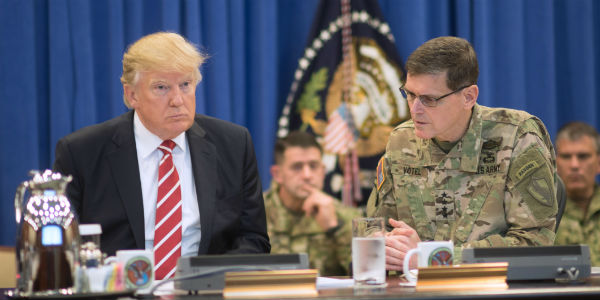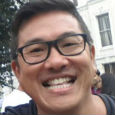Resistance will come. But will Trump heed it? Lessons from Arendt and Skowronek
Mere weeks into his presidency, commentators are already having difficulties in characterising Donald Trump’s administration. Daniel Kato says rereading Hannah Arendt and Stephen Skowronek may provide some clues in deciphering the new president’s behaviour. Skowronek’s writings point to an ‘institutional thickening’ that may continue to emerge to check Trump, as it has done with out-of-control presidents in the past. But according to Arendt’s thinking, Trump may yet hunker down, drawing strength from the resistance to him, and continue to consolidate his cult of personality.

Trump discusses current military operations with Gen. Joseph Votel, February 2017. Photo: Chairman of he Joint Chiefs of Staff via a CC-BY 2.0 licence
For many, the behaviour and actions of the Trump administration in its first few weeks has raised questions and concerns as how to best it can be characterized. Is Trump a fascist, a populist demagogue, the latest iteration of the imperial presidency, or simply an idiot with an evil chief strategist? The delineations are not simply intellectual nit-picking, but reflect a growing concern that Trump is leading the country (and the world for that matter) down a dangerous road. In order to better unpack what is at stake, it’s informative to compare and contrast the divergent perspectives of political theorist Hannah Arendt and political scientist Stephen Skowronek. Arendt’s thinking raises cause for alarm while Skowronek provides reasons to stay calm:
Totalitarian leaders are actually free to do whatever they please and can count on the loyalty of their entourage even if they choose to murder them….It is in the nature of the movement that once the Leader has assumed his office, the whole organization is so absolutely identified with him that any admission of a mistake or removal from office would break the spell of infallibility which surrounds the office of the Leader and spell doom to all those connected with the movement…they fail to understand that their own conspiracy may eventually provoke the whole world into uniting against them.
– Hannah Arendt, Origins of Totalitarianism, (Harcourt Brace and Company, 1979), p. 387
Notwithstanding the mistaken intelligence that the Bush administration employed to make its case for the turn in Iraq, a pattern of stretching evidence, manipulating circumstances, and overreaching conclusions is unmistakeable in each muscle-flexing wars….Because of the machinations involved, there has been a tendency to personalize these wars as uniquely presidential…These were supremely political wars, the pet projects of an ideologically charged, upwardly mobile and strategically situated coterie…the political costs extracted by such wars tend to be severe for the president and his party alike. With shaky initial pretexts, such wars tend to be quick to exhaust their political support. Their demands drive disaffection through the president’s own ranks and spark political reaction nationwide.
–Stephen Skowronek, Presidential Leadership in Political Time: Reprise and Reappraisal, (University Press of Kansas, 2008), p. 163-165
Even though Arendt is describing totalitarian regimes and Skowronek is referencing the United States, both nevertheless point to political leadership that is ideologically isolated, personality driven, and divorced from reality. Current debates of how best to categorize Trump miss the underlying similarities across both accounts. Trump not only exhibits Arendtian characteristics of hubris, incessant claims of infallibility, and cultish-like loyalty from his entourage, but he also exhibits Skownronek-ian attributes of stretching evidence, manipulating circumstances and overreaching conclusions.
Executive delusions of grandeur operate in multiple political settings. According to Skowronek, totalitarian-like attributes have surfaced throughout American history in the form of ‘muscle-flexing wars,’ but each nonetheless paved the way for its own demise. Skowronek’s pattern of executive overreach and subsequent collapse is not the same trajectory that Arendt describes, however. Whereas Skowronek points out internal dissension and the exhaustion of political support, Arendt alludes to how opposition can fuel further consolidation of support. In other words, for Skowronek there seems to be an inherent come-to-Jesus moment that dawns on every administration that overly pursues a personal vendetta – whereas for Arendt, that realisation might never come.
For Skowronek, the key component that reins in an out-of-control presidency is what he describes as ‘institutional thickening,’ which refers to the proliferation of organized interests and independent authorities that accumulate over time. According to Skowronek, “the progressive thickening of the institutional universe of presidential action has hemmed in those incumbents who hold the most compelling warrants for independent action, making it possible for other actors to mount more formidable resistance to their will” (p. 31). This past week saw much of this institutional thickening emerge. Whether it was bureaucratic pushback, judicial obstruction, Republican disagreement or even Democratic opposition, the various countermeasures to executive overreach occurred just as Skowronek predicted.
With that said, it is unclear if these self-correcting mechanisms will have the same impact as they once did. There are structural trends and idiosyncratic aspects to Trump that suggest otherwise. National politics have been trending toward the growing personification of the state with the president. Structural trends include the rise of the plebiscitary presidency (when an elected leader is given almost all of the power), the imperial presidency, the growing revulsion against elitism, and complete dissatisfaction with Congress.
There are also idiosyncratic aspects to Trump that are troubling. The first was actually laid out in the Federalist Papers #68:
The process of election affords a moral certainty, that the office of President will seldom fall to the lot of any man who is not in an eminent degree endowed with the requisite qualifications. Talents for low intrigue, and the little arts of popularity, may alone suffice to elevate a man to the first honors in a single State; but it will require other talents, and a different kind of merit, to establish him in the esteem and confidence of the whole Union, or of so considerable a portion of it as would be necessary to make him a successful candidate for the distinguished office of the President of the United States.
It is unclear the degree to which the countermeasures that Skowronek alludes to hinges upon this notion that leaders not be of ‘low intrigue.’ Put simply, it is not clear if Trump even cares (let alone is aware) of the opposition to his policies. It is also not certain how committed Trump is to pursuing any particular agenda other than the feeding of his own ego. The narcissistic drive is perhaps of a different kind than any previous president in that it might be completely shorn of any sense of national purpose. Thus trying to hold him accountable is tantamount to a personal attack that he will reject at all costs.
Secondly, even though Skowronek appreciates the importance of repudiation when it comes to presidential authority, he nonetheless might have underestimated the revanchist power of racism and misogyny. According to Skowronek, “the American presidency has proven itself most effectively politically as an instrument of negation…it has functioned best when it has been directed toward dislodging established elites, destroying the institutional arrangements that support them, and clearing the way for something entirely new” (p.27). However, his depiction of negation is almost solely concerned with economic policies and foreign affairs. There is hardly any mention of racism, let alone sexism. Trump’s revanchist attributes extend beyond Skowronek’s depiction of previous reconstructive presidents in that Trump’s repudiation is centred upon a racialised and misogynistic critique that transcends economic and foreign policies. The racist and misogynist vitriol that Trump is stirring up is such that he was not only able to win the election despite the high favorability ratings of Obama, but also that many of Trump’s supporters were actually worried about his temperament with foreign affairs.
The fact that the Trump administration is facing resistance is in some ways predicted by both Arendt and Skowronek. The biggest difference however lies with Trump’s response to such resistance. Will Trump initiate a course correction in lieu of the growing resistance to his actions, as predicted by Skowronek and evidenced by George W. Bush following the 2006 mid-term elections? Or will Trump hunker down in a manner that Arendt predicted and continue consolidating his cult of personality? It is not yet clear which direction it will go but there have been hints that Trump will not react the same way previous presidents have when facing opposition.
The institutional thickening that Skowronek describes is but one aspect of his cyclical model of presidentialism. The other aspect is the president’s responsiveness. Whereas previous presidents have readjusted their behaviour in light of clear signs of mounting opposition, it should not be taken for granted that Trump will do the same. He might represent an altogether different kind of leader, one who instead doubles down when facing resistance. Intransigence is a very likely option. The point is not to presume that resistance will necessarily lead to a course correction.
This is not to take anyway anything from Skowronek per se, but rather alludes to the exceptional moment we live in. As Peter Levine noted, much of political science has “an implied value-stance: our system works, it follows rules and norms, it’s fairly durable, and the players are reasonably competent professionals who support the regime,” while political theorists “are quick to see that regimes can change, that they can be very bad, that they have debatable normative foundations, and that ideas can be revolutionary.” If in fact our system is not durable and things are very bad, then it might be time to (re)read political theory. As Carl Schmitt, another political theorist once stated, “Democracy seems fated then to destroy itself in the problem of the formation of the will.”
This post represents the views of the author and not those of Democratic Audit. It first appeared at LSE US Politics and Policy.
 Daniel Kato is a Lecturer in US Politics at Queen Mary, University of London. His, book, ‘Liberalizing Lynching: Building a New Racialized State’, was published by Oxford University Press and was awarded the 2016 Charles Taylor Book Award.
Daniel Kato is a Lecturer in US Politics at Queen Mary, University of London. His, book, ‘Liberalizing Lynching: Building a New Racialized State’, was published by Oxford University Press and was awarded the 2016 Charles Taylor Book Award.





 Democratic Audit's core funding is provided by the Joseph Rowntree Charitable Trust. Additional funding is provided by the London School of Economics.
Democratic Audit's core funding is provided by the Joseph Rowntree Charitable Trust. Additional funding is provided by the London School of Economics.
Really what this piece is trying to dress up in cod philosophising can be summed up in an addition to the last couple of lines – the author is saying that “democracy destroys itself…when it chooses someone I don’t like”.